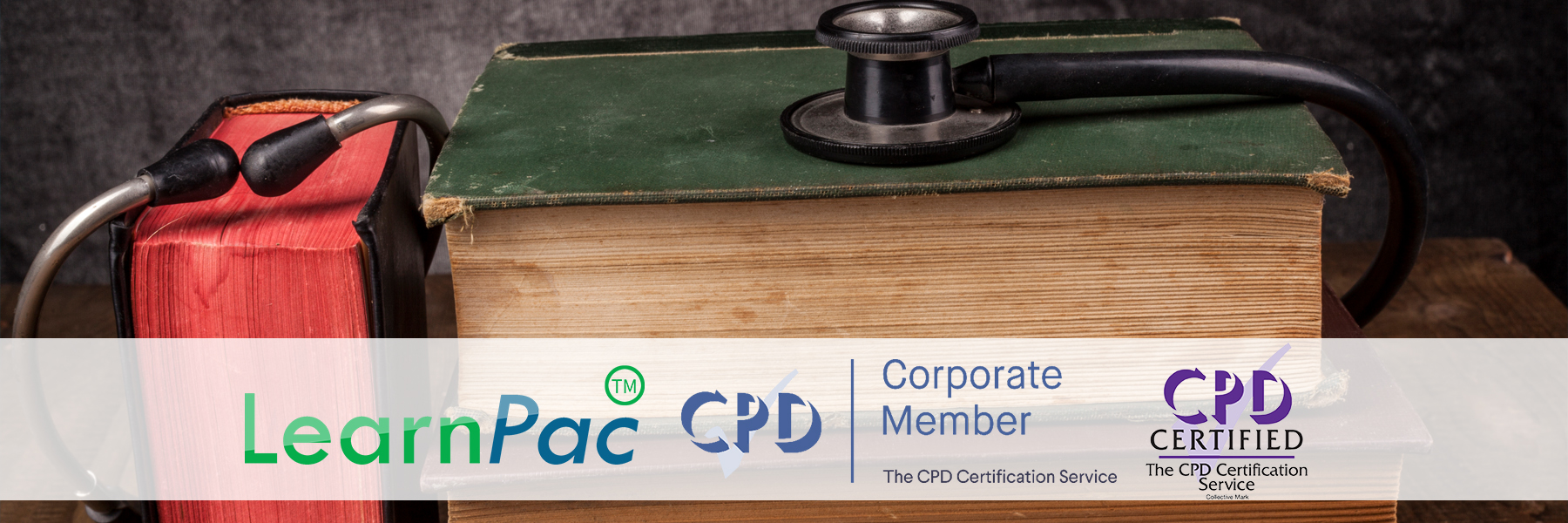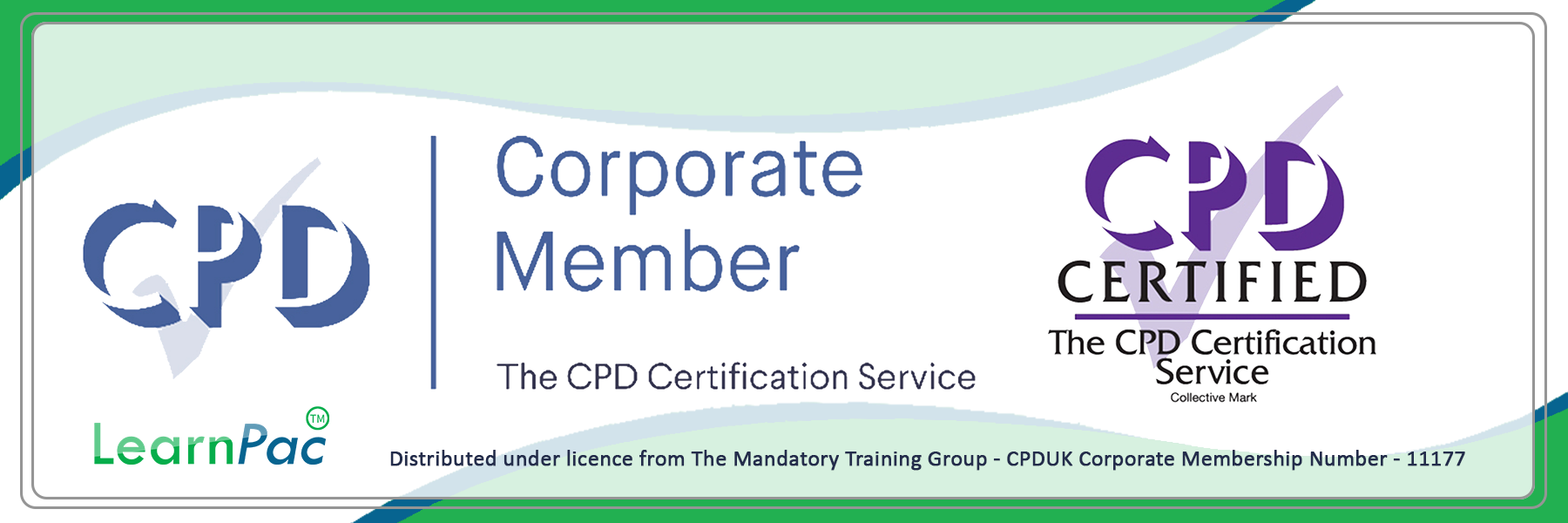Healthcare Law and Ethics - E-Learning Courses - CPDUK Accredited

Healthcare Law and Ethics – E-Learning Courses with Certificates – CPDUK Accredited.
LearnPac Systems is the leading UK provider of accredited statutory and mandatory training courses for all sectors, including health and social care, education, local government, private and charity sectors.
Healthcare law and ethics e-learning courses explore the legal policy and ethical issues encountered by health care professionals in the continuously evolving healthcare system.
Our healthcare law and ethics e-learning courses aid in exploring the legal policy and ethical issues that health care professionals typically encounter in the continuously evolving healthcare system.
Browse our Healthcare Law and Ethics - E-Learning Courses
Healthcare Law and Ethics: Frequently Asked Questions and Answers
Healthcare Law and Ethics – E-Learning Courses with Certificates – CPDUK Accredited – LearnPac Systems UK.
Here at LearnPac Systems, we receive many questions about healthcare law and ehtics. We have provided answers to the most frequently asked questions about healthcare law and ethics.
Click on the text below to see the answers to the Frequently Ask Questions about Healthcare Law and Ethics.
Healthcare law and ethics courses explore the legal policy and ethical issues encountered by health care professionals in the continuously evolving healthcare system. Furthermore, learners will gain the ability to analyse legal and ethical health care resources by engaging in interactive discussions and educational research on matters such as:
- Government regulation of health care providers
- Patient consent to and refusal of treatment
- Human reproduction issues
- Privacy and confidentiality
- Tax exemption
- Antitrust, fraud and abuse
- Mental health issues
- Health information management.
LearnPac Systems is the leading UK provider of accredited statutory and mandatory training courses for all sectors, including health and social care, education, local government, private and charity sectors.
Health care ethics, also known as medical ethics, is the application of the core principles of bioethics, such as autonomy, beneficence, nonmaleficence, justice, to medical and health care decisions. It is a multidisciplinary lens of viewing complex issues to make suitable recommendations regarding a course of action.
LearnPac Systems is the leading UK provider of accredited statutory and mandatory training courses for all sectors, including health and social care, education, local government, private and charity sectors.
Click here for CQC Mandatory Training Courses for Healthcare Professionals – CPDUK Accredited
Healthcare law and ethics will help ensure that medical care professionals, workers and staff are held accountable to the public. Ethical standards in medical care also promote other important moral and social values such as social responsibility, human rights, compliance with the law and patient safety.
LearnPac Systems is the leading UK provider of accredited statutory and mandatory training courses for all sectors, including health and social care, education, local government, private and charity sectors.
Click here for Mandatory Training Courses for Nurses and NHS Health Care Staff
Medical law and ethics considers the rights of patients and responsibilities of doctors regarding complex moral debate. Being legal does not necessarily make a decision or action ethical.
Health care ethics is the field of applied ethics concerning the vast array of moral decision-making situations. It arises in the practice of medicine and to the procedures and policies designed to guide such practice.
Health law is the area of law concerned with the health of individuals and populations, the provision of health care and the operation of the health care system.
Public health law typically has three major areas of practice, including police power, disease and injury prevention, and the law of populations.
Some examples of common medical ethical issues include:
- Patient privacy and confidentiality
- Transmission of diseases
- Relationships
- End of life issues.
Bioethicists often refer to the four basic principles of health care ethics when evaluating the merits and difficulties of medical procedures. Ideally, for a medical practice to be considered “ethical”, it must respect autonomy, justice, beneficence, and nonmaleficence.
Healthcare ethics is essential as it ensures that the medical office conducts business and practices medicine in an ethical, lawful and honest manner. Ethical issues also include understanding and following business and healthcare ethical guidelines.
Health laws are used to formalise the commitment to goals, and to create a drive for action in meeting the goal of universal health coverage. To enable cooperation and achieve health goals, people use the law to create different organisations such as hospitals and relationships, including contracts for providing health services.
Healthcare attorneys deal with the regulations and practices of healthcare institutions such as hospitals and nursing homes. They often represent healthcare organisations and healthcare professionals by providing advice, drafting contracts, and aiding in the creation of company policies.
Healthcare professionals, including nurses and physicians, could find that a master’s degree program in health law can prepare them for positions in healthcare administration as nurse managers, compliance officers or clinical directors. Healthcare lawyers focus on cases involving healthcare issues.
The four principles of health care ethics are autonomy, beneficence, nonmaleficence, and justice.
Public health aims to improve the quality of life through the prevention and treatment of disease, including mental health. This is done through the surveillance of cases and health indicators and the promotion of healthy behaviours.
The principle of justice states that there should be an element of fairness in all medical decisions: fairness in decisions that burden and benefit, as well as equal distribution of scarce resources and new treatments, and for medical practitioners to uphold applicable laws and legislation when making choices.
Healthcare managers of today and tomorrow will be facing the following five ethical issues in the course of delivering responsible and compassionate patient care:
- Patient confidentiality
- Patient relationships
- Malpractice and negligence
- Informed consent
- Issues related to physician-assisted suicide (PAD).
Principlism is a commonly used ethical approach in healthcare and biomedical sciences. It emphasises four key ethical principles of autonomy, beneficence, nonmaleficence, and justice, and incorporates ethical theories, virtues and practical wisdom.
The UK has a government-sponsored universal healthcare system called the National Health Service (NHS). The NHS consists of a series of publicly funded healthcare systems in the UK. It includes the National Health Services (England), NHS Scotland, NHS Wales and Health and Social Care in Northern Ireland.
The purpose of ethics is to define acceptable human behaviour by knowing the types of actions, its consequences, and the limits of both humans and actions, as well as their acceptability.
In general, laws are made based on the moral values of a particular society. They describe the fundamental behaviour of human beings. In other words, laws represent the minimum standards of human behaviours, that is, ethical behaviour.
Health and safety legislation is enforced by the Health and Safety Executive (HSE) or by local authority environmental health officers, depending on the main activity carried out at individual workplaces.
LearnPac Systems is the leading UK provider of accredited statutory and mandatory training courses for all sectors, including health and social care, education, local government, private and charity sectors.
Click here for more Healthcare Law and Ethics E-Learning Courses
On successful completion of each of the healthcare law and ethics courses modules, you will be able to download, save and/or print a quality assured continuing professional development (CPD) certificate. Our CPD certificates are recognised internationally and can be used to provide evidence for compliance and audit.
The CPD Certification Service (CPDUK) accredits all of our statutory and mandatory training courses as conforming to universally accepted Continuous Professional Development (CPD) guidelines.
LearnPac Systems is distributed under the licence from The Mandatory Training Group – CPDUK Corporate Memebrship Number – 1117.




